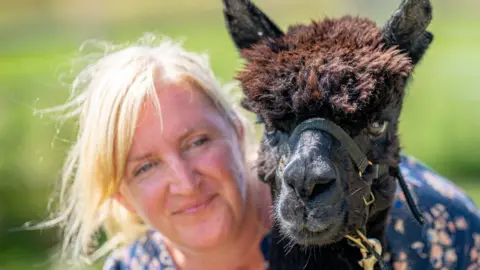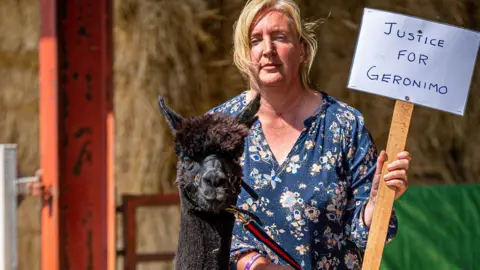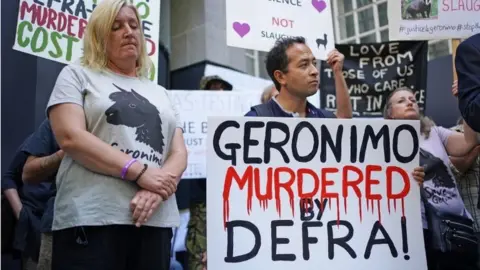Geronimo the alpaca: TB test results disputed
 PA Media
PA MediaA government examination on Geronimo the alpaca has found possible evidence of bovine tuberculosis (bTB), but supporters are disputing the results.
Authorities took Geronimo from his farm near Bristol on 31 August and killed him after he twice tested positive for the disease.
Vets working with his owner have said there were no visible lesions of bTB.
But the Department of Environment, Food and Rural Affairs (Defra) said post-mortem tests showed TB-like lesions.
The animal's owner, Helen Macdonald, requested a copy of the post-mortem examination after the alpaca was removed from her farm in South Gloucestershire and culled.
Lawyers acting for the veterinary nurse said she had received a letter from the government legal department containing the preliminary findings.
These findings were then reviewed by veterinary surgeons supporting Ms Macdonald.
 PA Media
PA MediaIn a statement, the lawyers said the "preliminary gross post-mortem findings are negative for visible lesions typical of Bovine Tuberculosis".
"For clarity there are no white or cream caseous, enlarged abscesses typical for bTB in alpacas whether in the lungs, bronchial, mediastinal or retropharyngeal lymph nodes," it said.
It added that Ms Macdonald had formally requested the full findings of the post-mortem report along with all relevant documents.
"She has further requested that both fresh, frozen and formalin fixed tissue and fluid samples be preserved and provided to an independent expert to carry out further tests."
'TB-like lesions'
In a statement, the government chief veterinary officer Dr Christine Middlemiss said: "We have completed the initial post-mortem examination of Geronimo.
"A number of TB-like lesions were found and in line with standard practice these are now undergoing further investigation.
"These tests include the developing of bacteriological cultures from tissue samples which usually takes several months - we would expect to complete the full post-mortem and culture process by the end of the year."
 PA Media
PA MediaMs Macdonald along with members of the Justice for Geronimo and Stop Badger Cull campaigns, have been protesting in London.
Speaking outside Defra in Westminster, she said: "We urge the Government to act with compassion and cooperation, which to date has been severely lacking, creating deep and unnecessary distress to Geronimo.
"We call on the secretary of state to tender his resignation immediately," she said.
She has also vowed to fight for animal rights in "honour" of Geronimo.
"Geronimo was a blessing in my life. He touched the world. He was loved and precious to very many people and he lives on.
"I miss him. But I will do him the honour of fighting for him and making sure his legacy lives on for all animals."

Geronimo timeline
 PA Media
PA Media- Geronimo is brought to England from New Zealand in August 2017 by his owner Helen Macdonald
- The alpaca twice tests positive for bovine tuberculosis in August and November that year
- He is put into isolation away from the rest of the herd at the farm in Wickwar
- The government applies for a court order in July 2018 to have him destroyed
- Geronimo is given a stay of execution, with a deadline of the end of August for his slaughter
- Ms Macdonald seeks a judicial review claiming new evidence shows the animal is healthy, marking the start of a series of lengthy legal battles
- In November, Ms Macdonald wins the right to a review at the High Court in London
- A hearing gets under way in March 2019 and Ms Macdonald claims government experts relied on "flawed science"
- The case is dismissed in July 2019
- Ms Macdonald starts an appeal and an order is made preventing Geronimo's death pending the application
- She takes out an emergency injunction to delay a warrant to cull the animal before an appeal hearing on 29 July 2021
- The case is once again dismissed. A judge agrees to delay the start of a second execution warrant until 5 August, which is later extended to 4 September
- Geronimo is euthanised on 31 August

Follow BBC West on Facebook, Twitter and Instagram. Send your story ideas to: [email protected]
